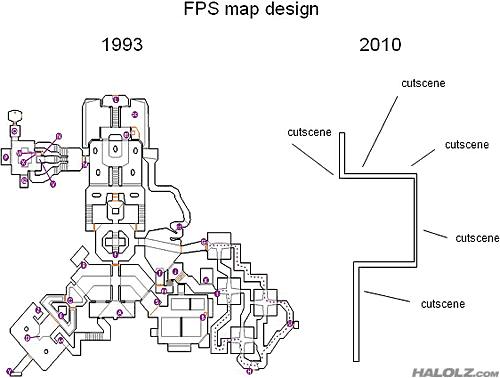There's difficulty, and there's "dumbed down". Difficulty can be achieved simply by having tougher enemies (more hit points, more powerful attacks), debuffing the player's abilities, speeding up the gameplay, removing "hail mary" items like health packs/potions, etc.
Dumbed down is more about reducing player choice. If before, a player had three corridors to waltz down, and now only has one route, it's dumbed down. If a player could design a character with 30 options before, and now only has four (all of which will be maxed by game's end), again-- dumbed down. If a player could talk to twenty NPCs before, but now can only talk to the one with the big flashing arrow over his head...you get the idea.
The diff is that the former is easy to design, and moderate with a slider on the options page. The latter is fundamental game design.
But. How much of that reduction in choice is real? To echo the Extra Punctuation video on the "Illusion of Choice", if there is really only one or two optimal builds for that character with 30 odd ability choices, is it really that different from our streamlined game? If talking to all those NPCs only results in a few throw away lines that contribute nothing to the narrative, perhaps it is really no different than the game with the flashing yellow arrow over the guy you really need to talk to, except in time wasted on repetitive uninteresting gameplay.
I was struck by Dragon Age 2's FedEx missions. Yes, they were silly. You find an item and immediately know who to give it to, and that someone was typically on your way to an actually interesting plot point (unlike said FedEx quest). But isn't that what FedEx quests really boil down to? I don't think the answer is to do quests like DA2, but neither do I think that those quests contribute much in other games.
Perhaps the real answer is not to return to the Byzantine game mechanics of days past, but to focus on new and better forms of gameplay. Streamlining a game down to "push button, save princess" is no good. But neither is "push 300 buttons, save princess". There's ways of challenging with simple game mechanics (Portal, anyone?), after all.
Dumbed down is more about reducing player choice. If before, a player had three corridors to waltz down, and now only has one route, it's dumbed down. If a player could design a character with 30 options before, and now only has four (all of which will be maxed by game's end), again-- dumbed down. If a player could talk to twenty NPCs before, but now can only talk to the one with the big flashing arrow over his head...you get the idea.
The diff is that the former is easy to design, and moderate with a slider on the options page. The latter is fundamental game design.
But. How much of that reduction in choice is real? To echo the Extra Punctuation video on the "Illusion of Choice", if there is really only one or two optimal builds for that character with 30 odd ability choices, is it really that different from our streamlined game? If talking to all those NPCs only results in a few throw away lines that contribute nothing to the narrative, perhaps it is really no different than the game with the flashing yellow arrow over the guy you really need to talk to, except in time wasted on repetitive uninteresting gameplay.
I was struck by Dragon Age 2's FedEx missions. Yes, they were silly. You find an item and immediately know who to give it to, and that someone was typically on your way to an actually interesting plot point (unlike said FedEx quest). But isn't that what FedEx quests really boil down to? I don't think the answer is to do quests like DA2, but neither do I think that those quests contribute much in other games.
Perhaps the real answer is not to return to the Byzantine game mechanics of days past, but to focus on new and better forms of gameplay. Streamlining a game down to "push button, save princess" is no good. But neither is "push 300 buttons, save princess". There's ways of challenging with simple game mechanics (Portal, anyone?), after all.

